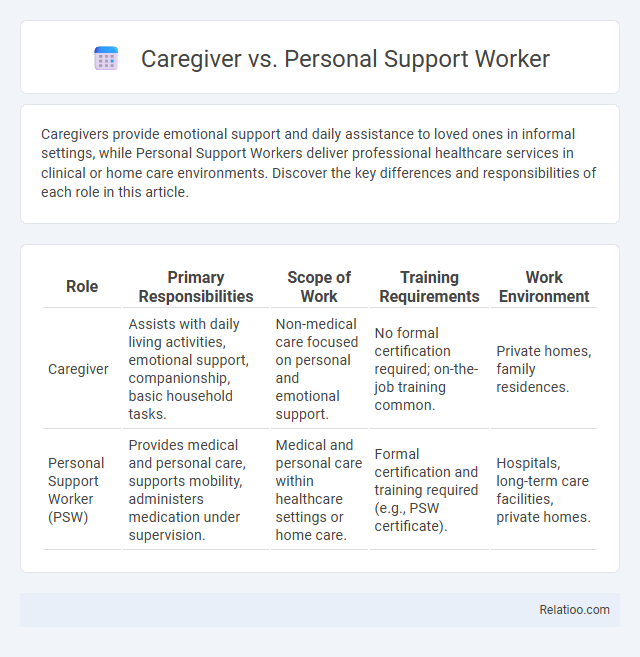Caregivers provide emotional support and daily assistance to loved ones in informal settings, while Personal Support Workers deliver professional healthcare services in clinical or home care environments. Discover the key differences and responsibilities of each role in this article.
Table of Comparison
| Role | Primary Responsibilities | Scope of Work | Training Requirements | Work Environment |
|---|---|---|---|---|
| Caregiver | Assists with daily living activities, emotional support, companionship, basic household tasks. | Non-medical care focused on personal and emotional support. | No formal certification required; on-the-job training common. | Private homes, family residences. |
| Personal Support Worker (PSW) | Provides medical and personal care, supports mobility, administers medication under supervision. | Medical and personal care within healthcare settings or home care. | Formal certification and training required (e.g., PSW certificate). | Hospitals, long-term care facilities, private homes. |
Understanding the Roles: Caregiver vs Personal Support Worker
Caregivers provide essential emotional and physical support to individuals who require assistance with daily living activities, often focusing on personal care and companionship in home settings. Personal Support Workers (PSWs) possess specialized training to deliver medical and rehabilitative support under healthcare supervision, including tasks like medication management and mobility assistance. Understanding these distinct roles clarifies that caregivers typically offer informal, non-clinical care, whereas PSWs fulfill professional, healthcare-oriented functions within medical or residential care environments.
Key Responsibilities of Caregivers
Caregivers primarily focus on providing emotional support, assisting with daily living activities such as bathing, dressing, and meal preparation, and ensuring the overall comfort and well-being of clients in home or community settings. Unlike Personal Support Workers, who often have formal healthcare training and perform medical-related tasks, caregivers emphasize companionship and non-medical assistance tailored to individual needs. Their key responsibilities include monitoring client conditions, facilitating social interaction, and coordinating with family members or healthcare providers to support holistic care.
Duties and Scope of Personal Support Workers
Personal Support Workers (PSWs) provide essential hands-on care, assisting with activities of daily living such as bathing, dressing, and mobility support, focusing on both physical and emotional well-being. Their duties often include monitoring vital signs, administering prescribed treatments, and reporting changes in health to healthcare professionals, reflecting a broader scope than general caregivers who primarily offer companionship and basic support. Your choice of a PSW ensures access to trained personnel equipped to manage more complex health-related tasks in home or institutional care settings.
Training and Certification Requirements
Caregivers generally offer basic assistance and companionship without formal certification, while Personal Support Workers (PSWs) undergo specific training programs and earn certification that qualify them to provide medical and personal care in various healthcare settings. Caregiver training varies widely by region but typically lacks the standardized curriculum and regulatory oversight required for PSWs, who complete recognized coursework in anatomy, hygiene, and patient care techniques. Understanding the distinctions in training and certification helps ensure Your loved ones receive care from professionals properly equipped to meet their health and personal support needs.
Work Environments: Home, Facility, or Community
Caregivers primarily provide assistance in private homes, supporting activities of daily living for individuals requiring personal care. Personal Support Workers (PSWs) often work in long-term care facilities, hospitals, and community health organizations, delivering medical and non-medical support under supervision. Both roles extend to community settings, but PSWs typically have a broader scope involving clinical tasks in structured environments.
Skills Essential for Each Role
Caregivers often specialize in emotional support and daily living assistance, focusing on empathy and communication skills to improve Your loved one's quality of life. Personal Support Workers (PSWs) require clinical skills such as basic medical knowledge, personal hygiene care, and mobility assistance to provide more hands-on healthcare support. While all roles demand patience and reliability, PSWs and caregivers may require certification or training in first aid and health monitoring, distinguishing them from general caregivers who prioritize companionship and routine assistance.
Levels of Medical Involvement
Caregivers typically provide basic assistance with daily activities such as bathing, dressing, and meal preparation, involving minimal medical tasks. Personal Support Workers (PSWs) have more specialized training to offer hands-on care including medication management, wound care, and monitoring vital signs under supervision. Nurses exhibit the highest level of medical involvement, performing complex medical procedures, administering injections, and creating care plans, reflecting their extensive healthcare education and licensure.
Legal and Ethical Considerations
Caregivers and Personal Support Workers (PSWs) differ in their legal and ethical responsibilities, with PSWs typically being regulated under provincial health authorities requiring adherence to standardized care protocols and professional codes of conduct. Caregivers, often employed in private homes, may have less formal regulation but must still comply with legal requirements such as privacy laws and duty of care obligations. Both roles demand ethical considerations including respect for patient autonomy, confidentiality, and informed consent to ensure safe and dignified care.
How to Choose Between a Caregiver and a PSW
Choosing between a caregiver and a Personal Support Worker (PSW) depends primarily on the level of care required by the individual. Caregivers typically provide non-medical assistance such as companionship, meal preparation, and light housekeeping, whereas PSWs deliver more specialized support, including personal hygiene, medication management, and basic medical monitoring. Evaluating factors like the patient's medical needs, required certifications, and budget constraints helps determine whether a caregiver's general support or a PSW's clinical skills are more appropriate.
Impact on Clients and Families
Caregivers, Personal Support Workers (PSWs), and Home Care Aides each play distinct roles in supporting clients and their families, with varying impacts on emotional and physical well-being. Caregivers often provide comprehensive, long-term emotional support, fostering deep relationships that enhance clients' quality of life and relieve family stress. Personal Support Workers offer specialized medical assistance and daily living support, improving health outcomes and enabling families to maintain balanced caregiving responsibilities.

Infographic: Caregiver vs Personal Support Worker
 relatioo.com
relatioo.com